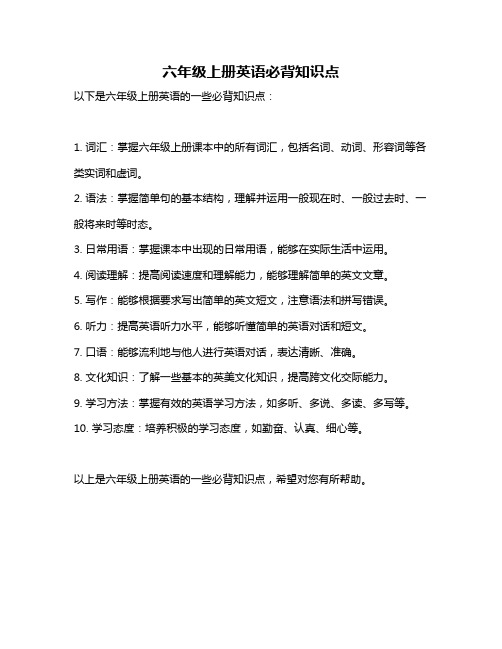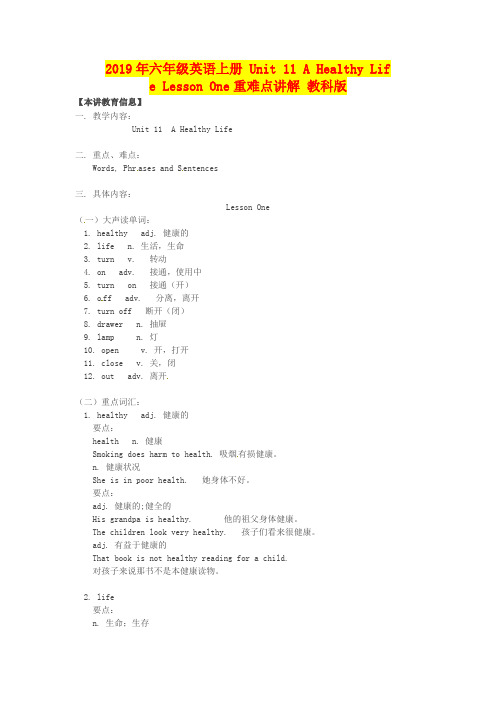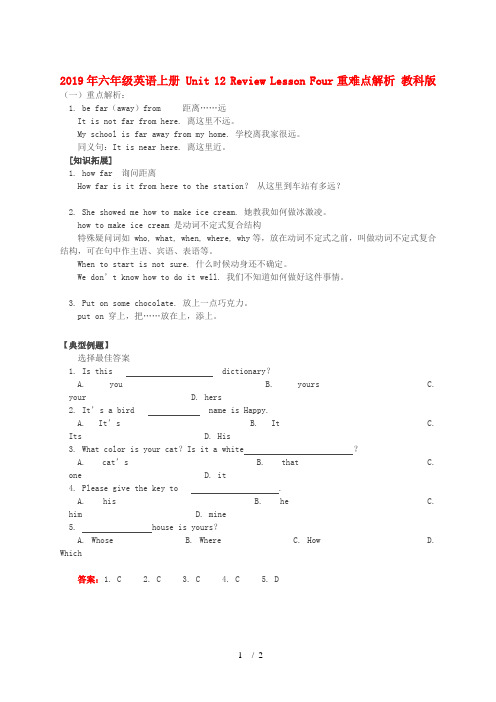2019-2020学年教科版六年级英语上学期知识点
- 格式:docx
- 大小:29.45 KB
- 文档页数:9

六年级上册英语必背知识点
以下是六年级上册英语的一些必背知识点:
1. 词汇:掌握六年级上册课本中的所有词汇,包括名词、动词、形容词等各类实词和虚词。
2. 语法:掌握简单句的基本结构,理解并运用一般现在时、一般过去时、一般将来时等时态。
3. 日常用语:掌握课本中出现的日常用语,能够在实际生活中运用。
4. 阅读理解:提高阅读速度和理解能力,能够理解简单的英文文章。
5. 写作:能够根据要求写出简单的英文短文,注意语法和拼写错误。
6. 听力:提高英语听力水平,能够听懂简单的英语对话和短文。
7. 口语:能够流利地与他人进行英语对话,表达清晰、准确。
8. 文化知识:了解一些基本的英美文化知识,提高跨文化交际能力。
9. 学习方法:掌握有效的英语学习方法,如多听、多说、多读、多写等。
10. 学习态度:培养积极的学习态度,如勤奋、认真、细心等。
以上是六年级上册英语的一些必背知识点,希望对您有所帮助。

2019年六年级英语上册 Unit 11 A Healthy Life Lesson One重难点讲解教科版【本讲教育信息】一. 教学内容:Unit 11 A Healthy Life二. 重点、难点:Words, Phr ases and S entences三. 具体内容:Lesson One(一)大声读单词:1. healthy adj. 健康的2. life n. 生活,生命3. turn v. 转动4. on adv. 接通,使用中5. turn on 接通(开)6. o ff adv. 分离,离开7. turn off 断开(闭)8. drawer n. 抽屉9. lamp n. 灯10. open v. 开,打开11. close v. 关,闭12. out adv. 离开(二)重点词汇:1. healthy adj. 健康的要点:health n. 健康Smoking does harm to health. 吸烟有损健康。
n. 健康状况She is in poor health. 她身体不好。
要点:adj. 健康的;健全的His grandpa is healthy. 他的祖父身体健康。
The children look very healthy. 孩子们看来很健康。
adj. 有益于健康的That book is not healthy reading for a child.对孩子来说那书不是本健康读物。
2. life要点:n. 生命;生存How did life begin? 生命是如何起源的?n. 生物,活的东西There is no life on the moon. 月球上没有生物。
n. 人生;世上Life isn't all fun.人生不都是充满欢笑。
n. 生活(状态)I know that he has a very hard life. 我知道他日子过得很艰难。


教科版六年级上册英语全册模块知识点复习资料Module 1 Country life本模块重点学习谈论农村生活的句型。
现将本模块主要句型及相关知识归纳如下: 词汇分类名词:country.农村field田grass草cow奶牛;母牛goose 鹅river河;江air空气sheep绵羊goat山羊grandparent祖父(母);外祖父(母)动词:pick摘give给milk挤奶ride骑take花费其他: still仍然few极少;几乎没有other其他的;别的;其他的(人或事) 习惯搭配/短语pick some apples摘一些苹果grow rice种植水稻cut grass割草feed the animals喂动物wake up醒来ride my bike骑自行车every day每天after school放学后a few几个、条on your farm在你的农场里in this field.在这片田里on the farm在农场里on the river在河面上plenty of充足的,足量的help…with.在……(方面)帮助惯用表达式So many things..很多东西。
Oh yes.喊,是的。
They look lovely.它们看起来很可爱公式化句型询问对方在农场里种植什么的句型What do you grow on your/the farm?表达“如果你想要的话,你可以做某事”的句型You can pick some apples or oranges from the trees if you want.You can have a picnic in the park if you want.表达我们用有某物的数量的句型We have more than fifty cows/ten eggs.Module 2 City life本模块重点学习询问对方来自哪里的句里以及谈论与城市生活相关的话。

英语知识点六年级上册
英语知识点六年级上册包括以下内容:
1. 名词:学习并掌握可数名词和不可数名词的概念和用法,以及它们的单复数形式。
2. 冠词:学习并掌握定冠词“the”和不定冠词“a”的用法,以及冠词在句子中的作用。
3. 代词:学习并掌握人称代词、物主代词、指示代词、反身代词等代词的用法,以及它们在句子中的位置和作用。
4. 形容词和副词:学习形容词和副词的概念和用法,以及它们在句子中的位置和作用。
5. 介词:学习并掌握常用介词的用法,以及介词在句子中的作用。
6. 动词:学习并掌握常用动词的用法,以及动词在句子中的时态和语态。
7. 句子结构:学习并掌握简单句、复合句和复杂句的结构,以及各种句型的转换和使用。
8. 日常用语:学习并掌握日常生活中的常用表达方式和口语表达技巧,以及如何运用英语进行交流和表达。
9. 阅读理解:学习并掌握阅读技巧和方法,提高阅读速度和理解能力,包括快速阅读、细节理解、推理判断等。
10. 写作:学习并掌握写作技巧和方法,提高写作能力和表达能力,包括段落组织、篇章结构、语言表达等。
以上是英语知识点六年级上册的主要内容,通过学习和掌握这些知识点,可以帮助学生更好地理解和运用英语语言,提高英语水平和交际能力。

2019年六年级英语上册 Unit 12 Review Lesson Four重难点解析教科版(一)重点解析:1. be far(away)from 距离……远It is not far from here. 离这里不远。
My school is far away from my home. 学校离我家很远。
同义句:It is near here. 离这里近。
[知识拓展]1. how far 询问距离How far is it from here to the station?从这里到车站有多远?2. She showed me how to make ice cream. 她教我如何做冰激凌。
how to make ice cream 是动词不定式复合结构特殊疑问词如 who, what, when, where, why等,放在动词不定式之前,叫做动词不定式复合结构,可在句中作主语、宾语、表语等。
When to start is not sure. 什么时候动身还不确定。
We don’t know how to do it well. 我们不知道如何做好这件事情。
3. Put on some chocolate. 放上一点巧克力。
put on 穿上,把……放在上,添上。
【典型例题】选择最佳答案1. Is this dictionary?A. youB. yoursC.your D. hers2. It’s a bird name is Happy.A. It’sB. ItC.Its D. His3. What color is your cat?Is it a white ?A. cat’sB. thatC.one D. it4. Please give the key to .A. hisB. heC.him D. mine5. house is yours?A. WhoseB. WhereC. HowD. Which答案:1. C 2. C 3. C 4. C 5. D注:资料可能无法思考和涵盖全面,最好仔细浏览后下载使用,感谢您的关注!。
三年级起点六年级上册英语单元知识点总结
以下是三年级起点六年级上册英语单元知识点总结:
Unit 1: 自然景观
1. 掌握描述自然景观的词汇,如山脉、河流、湖泊、森林等。
2. 学习如何用英语表达对自然景观的感受和印象。
3. 了解不同国家的著名自然景观。
Unit 2: 节日
1. 掌握常见节日的英语表达方式,如春节、中秋节、圣诞节、万圣节等。
2. 学习如何用英语描述节日的传统习俗和庆祝方式。
3. 了解不同国家和地区的节日文化。
Unit 3: 爱好与兴趣
1. 掌握描述个人爱好和兴趣的词汇,如阅读、运动、音乐、绘画等。
2. 学习如何用英语表达自己的爱好和兴趣,以及为什么喜欢它们。
3. 了解不同人的爱好和兴趣,拓展自己的视野。
Unit 4: 动物世界
1. 掌握常见动物的英语表达方式,如猫、狗、鸟、鱼等。
2. 学习如何用英语描述动物的外貌特征、习性和生活环境。
3. 了解保护动物的重要性,培养爱护动物的意识。
Unit 5: 科普知识
1. 掌握关于科技发展的词汇,如机器人、人工智能、太空探索等。
2. 学习如何用英语表达对科技发展的看法和展望。
3. 了解科技在生活中的应用和影响。
以上是六年级上册英语五个单元的知识点总结,希望对你有所帮助。
由于英语知识点较多,在学习过程中,建议结合教材和课堂讲解,多做练习,加深理解和记忆。
六年级英语上册重点笔记
以下是六年级英语上册的一些重点笔记,供您参考:
1. 名词:名词是表示人、事物、地点或抽象概念的名称。
名词可以分为专有名词和普通名词两大类。
专有名词是特定的人、地点或事物的名称,首字母必须大写。
普通名词表示一类人、事物或抽象概念的名称。
2. 代词:代词是用来代替名词的词。
代词有人称代词、物主代词、反身代词、指示代词等。
3. 动词:动词是表示动作或状态的词。
动词可以分为实意动词、系动词、助动词和情态动词等。
4. 冠词:冠词是用来说明名词所指的范围的虚词。
常用的冠词有定冠词“the”和不定冠词“a”或“an”。
5. 介词:介词是用来说明名词与动词之间关系的虚词。
常用的介词有in、on、at、over、under等。
6. 形容词:形容词是用来描述名词的性质或特征的词。
形容词一般放在名词前面,表示对名词的修饰或限定。
7. 数词:数词是用来表示数量或次序的词。
数词可以分为基数词和序数词两类。
8. 句子结构:英语句子结构一般为主语+谓语+宾语,其中主语和谓语是句
子的主干,宾语是句子的支干。
9. 句子类型:英语句子可以分为陈述句、疑问句和祈使句三大类。
陈述句用来陈述事实或观点;疑问句用来提出问题;祈使句用来发出命令或请求。
10. 时态:时态是用来表示动作发生的时间和方式的语法形式。
英语中常用的时态有现在时、过去时、将来时等。
六年级上册英语知识梳理笔记
一、语法
1. 一般现在时:主语+动词原形/第三人称单数形式
2. 现在进行时:主语+be 动词+现在分词
3. 一般过去时:主语+动词过去式
4. 形容词比较级和最高级:比较级+than,the+最高级
5. 情态动词:can, could, must, should
二、词汇
1. 学习了关于家庭、学校、日常活动、兴趣爱好等方面的词汇。
2. 掌握了一些常用的形容词、动词和名词。
3. 学习了一些地点、时间、数字等基本词汇。
三、句型
1. 问候与打招呼:How are you? Nice to meet you.
2. 询问与回答:What's your name? Where do you live?
3. 喜好与兴趣:I like playing football. She enjoys reading books.
4. 描述与表达:The weather is sunny. He looks happy.
四、阅读理解
1. 能够阅读简单的英文故事、短文和通知。
2. 理解主要内容和细节。
3. 回答关于阅读材料的问题。
可编辑修改精选全文完整版教科版六年级上册基础知识汇总Unit 1 What are those farmers doing? 【重点单词】1.country农村2.field田3.pick摘4.grass草5.cow奶牛;母牛6.sheep绵羊(单复数一样)7.goat山羊8.goose鹅(复数是geese)9.river河;江10.other其他的;别的/其他的(人或事)11.few极少;几乎没有【重点短语】1.feed the chickens and ducks喂鸡和鸭子2.feed the pigs喂猪3.feed the horse喂马4.grow flowers and vegetables种花和蔬菜5.plant trees植树6.on your farm在你的农场里7.in this field在这片田里8.pick some apples摘一些苹果9.grow rice种植水稻10.cut grass割草11.feed the animals喂动物12.other animals其他动物13.a few几(个、条…)14.on the river在河面上【知识总结】1.What do you grow on your farm,Uncle Chen?句子结构:What do you grow on your/the farm?此句型用于询问对方在农场里种植什么。
例如:—What do you grow on your farm?你在你的农场里种植什么?—Some vegetables.一些蔬菜。
2.You can pick some apples or oranges from the trees if you want.句子结构:You can十动词(短语)原形十if you want..此句型用于表达“如果你想要的话,你可以…”。
if是连词,在这里用于引导条件状语从句,意为“如果”。
Module 1 Country lifeUnit 1 What are those farmers doing?一、词组feed the chickens and ducks feed the pigs feed the horsegrow flowers and vegetables plant trees cut grassany other on the farm a few…二、句型:1.What are those farmers doing?They’re cutting grass to feed the animals.2.What do you grow on your farm?3.We have a few goats and pigs.4.There are fruit trees in this field.5.There is a cow on the farm.三、语法名词单复数:1、一般情况下,直接加-s。
如:book-books, bag-bags, cat-cats, bed-beds2、以s. x. sh. ch结尾,加-es。
如:bus-buses, box-boxes, watch-watches3、以“辅音字母+y”结尾,变y为i, 再加-es。
如:family-families(家庭), strawberry-strawberries(草莓)4、以“f或fe”结尾,变f或fe为v, 再加-es。
5、不规则名词复数:man-men woman-women policeman(男警察)-policemenpolicewoman(女警察)-policewomen child(孩子)-childrenfoot-feet tooth-teeth单复同行:fish-fish sheep(羊)-sheep people-peopleChinese-Chinese Japanese-Japanese不可数名词:water(水) milk(牛奶) tea(茶) rice(米饭) orange(橙汁)juice(果汁)bread (面包)等Unit 2 A country life is a healthy life一、词组wake up more than plenty of ride a bikeget home at that time thanks for lots of…二、句型1. A country life is a healthy life.2. It takes about 40 minutes.3. I am always very busy but I never feel tired, because I have plenty of exercise.4. When I get home after school, there is still much work to do.Module 2 City lifeUnit 3 Where are you from?一、重点单词Tall new wide crowded big modern large cleancomfortable heavy slow quiet cheap noisy expensive…短语:be from visit a museum go to the cinemaeach other play with…二、句型:1. Where are you from? I am from New York City in America.2. It’s a big and modern city but it’s quite noisy.3. Everything is very expensive in NewYork.三、语法人称代词: 表示“你,我,他,她,它,你们,我们,他们,她们,它们”等She is our teacher. I am a studentPlease give me this book. This book is for me.名词性物主代词=形容词性物主代词+名词,所以名词性物主代词后面不必加名词。
如:Is this your book?No, it isn’t. It’s hers (her book).2、主语it的特殊用法1)it用来表示时间、天气等。
如:It’s six o’clock. 现在六点了。
(时间)It’s sunny today. 今天天气晴朗。
(天气)2)表示不明性别的婴儿、动物或不明身份、不确定的人。
如:-----Who’s knocking? -----It’s me.It’s a cute baby.3)用来指代前面提到过的事物。
如:------Where’s my dog? ------It’s in the kitchen. (阅读题)Unit 4 I like the city very much一、重点单词及短语Holiday interesting dirty afraid outside sell country theatre miss so many go outside be afraid to at night go to sleeptoo many go back home be different to ca n’t wait to be born all day….二、句子1. I like the city very much.2. There is much more to do in the city than in the countryside.3. I can’t go to sleep because there are too many cars.4. I can’t wait to go back home and see all my friends.四、语法too many太多;用来修饰可数名词复数。
too many carstoo much太多;用来修饰不可数名词。
too much waterModule 3 HealthUnit 5 What’s the matter with you?一、短语see a doctor go to the hospital this morning have a toothache brush teeth twice a day have a broken finger take a resthave a headache drink plenty of water have a cold take medicine have a fever have a stomachache go to school on weekdays…二、句子1. What’s matter with you?2. I have a stomachache.3. I’m sorry to hear that.4. You should see a doctor.5. I think you’ll be well soon.6. He asked me to take this medicine three times a day for a week.三、语法should是情态动词,没有人称和数的变化,后面接动词原形,句型结构:1)肯定句:主语+should+动词原形+其他.如:You should go to school.2)否定句:主语+shouldn’t+动词原形+其他.如:He shouldn’t be late for school.3)一般疑问句:Should+主语+动词原形+其他。
如:Should I take this medicine?Unit 6 The secret to good health一、短语take exercise stay healthy at least keep a g ood diet…二、句型1. First, get plenty of sleep,at least 8 hours each night.2. Don’t eat too much sweet or oily food.3. How old does Mr Li look?4. Get up early and go to bed early.5. Eat more vegetables and less meat.三、语法:祈使句是用来表达命令、请求、劝告、警告、禁止等语气的句子。
祈使句有以下几种类型:1)Do型----Do(表示行为的动词原形)+宾语+…Take the No.7 bus over there. Open the door.2)Be型----Be+名词/ 形容词+…Be quiet! Be careful.3)Let型----Let+宾语(通常是第一或第三人称宾格)+动词原形+…Let’s go home.4)Don’t型----Don’t+动词原形+…(本单元重点)Don’t talk in the classroom.5)No型----No+名词或动词ing形式.No photos! No smoking!Module 4 Past experiencesUnit 7 What did you do yesterday?一、短语go shopping a pair of meet my friend ride my bike see a filmread a story book have a party go to the countryside clean my homedo my homework last night last weekend last month last yearlast Saturday…二、句型1. What did you do yesterday?2. I went shopping with my mother.3. Where did you do yesterday?4. I stayed at home all day.三、语法:一般过去时A、概念:一般过去时主要表示过去某时发生的动作或存在的状态。
B、形式:含有实义动词(main verb)的一般过去时表示过去发生的动作,基本句型是“主语+动词过去式+其他”;通常的时间提示词有yesterday、last night、two hours ago、three years later、after a month……如:I made a cake yesterday.D、动词变过去式的规则变化:1)动词直接加“ed”:work— worked look—looked ,2)以不发音的字母“e”结尾的单词,直接加“d”:live —lived hope—hoped use—used,3)以辅音字母+y结尾的,变y为i加“ed”:study— studied carry—carried worry—worried,4)以元音字母+y结尾的,直接加“ed”:enjoy —enjoyed play—played5)以重读闭音节结尾的,双写最后的辅音字母+ed:stop— stopped plan—planned 6)不规则变化的动词过去式:have---had are---were get---got say---saidfeel---felt do/does---did am/is---was go---wentdrink--drank eat--ate bring----brought think----thoughtbuy----bought catch---- caught teach ---- taught sit----satwear----wore cut----cut sweep----swept sleep——slept become----became sell----sold read----read take----tookride----rode send----sent wear----wore win----wonrun----ran put----put know----knew make----madeUnit 8 A trip to Hong Kong一、短语go on a tr ip by train take a photo…by + 某种交通方式,表示“乘坐…..”乘地铁_______________ 乘公共汽车___________ 乘火车_____________ 乘小汽车_____________ 乘船_____________ 乘飞机_____________二、句子1. Ben sat with me until I felt better.2. Ben said he was very excited because it was his first visit to the island.3. We all hope the trees will grow well.4. I went on a trip to Hong Kong.5. I was very surprised.6. Ben sat with me until I felt better.Module 5 ChangesUnit 9 Was I a good girl back then?一、短语back then in the picture play with toys read books watch TVsurf the Internet watch cartoons draw cartoons smile a lot…keep it short short and fat tall and thin quiet and polite二、句子1. Was I a good girl back then?2. My hair was very long then, wasn’t it?三、重点精析语法:1. 反义疑问句(1)含义:表示说话人的看法没有把握,需要对方证实。